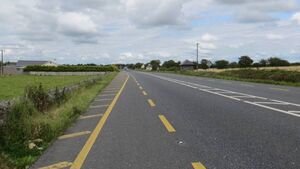Mayo councillor calls for action after spike in fatalities on N17

Ballyhaunis-based Fine Gael Councillor, Alma Gallagher, has urged a comprehensive investigation into the root causes of these alarming rise in fatalities on the N17 and other Irish roads.
Her calls come amidst a national debate on how best to address road safety, with some advocating for reduced speed limits and the closure of junctions with minor roads as immediate responses. However, Cllr Gallagher argues for a more nuanced approach.
“There needs to be a proper, thorough investigation into the causes and contributory factors in accidents, leading to fatalities, to establish the true causes. This is a job for the agencies tasked with roads and driving – Transport Infrastructure Ireland (TII) and the Road Safety Authority (RSA),” she stated.
Emphasizing the need for evidence-based solutions, Cllr Gallagher warned against hasty legislative changes.
“We cannot simply pass sweeping legislation as a rapid solution, in the hope that it will work. Cllr Gallagher stated that it is unbelievable that local authority road engineering teams were not able to view specific data on road collisions due to GDPR.
“As councillors have what is called a reserved function in determining speed limits on some routes. How can we make an informed decision when such a vital piece of information is missing.
“We need to know the true underlying causes of accidents and deal with those. We cannot just make an arbitrary conclusion as to what the cause is. We need to know the facts of each case, to propose informed changes, to make our roads safer.” Highlighting the complexity of road traffic incidents, Cllr Gallagher identified four main contributory factors: vehicle condition, road conditions, road engineering, and driver behaviour. She argued that each factor needs to be meticulously examined to understand its impact on road safety.
One of the proposed measures under discussion is the reduction of speed limits on national roads like the N17. Gallagher addressed this point, saying, “Reducing speed limits, for example, will affect the thousands of motorists who use the N17 on a daily basis. If a National Primary Route isn’t safe at 100 km/h – the upper limit on national roads – then road design and engineering have to be looked at. If the problem is with road conditions, then perhaps we need to look at engineering the surfaces and redesign so as to better accommodate excessive rainfall, wind, frost, or snow. We cannot wait for climate change to be addressed to keep our roads safe.” Gallagher also pointed to driver behaviour as a critical area for investigation and potential intervention. “And if the underlying cause is driver behaviour, we need to look at this too. The RSA could, for example, broadcast (on TV and social media) advisory adverts on specific aspects of driving that are causing these incidents – to inform and educate – but only if we know for certain what they are.” Cllr Gallagher also raised an important issue regarding modern vehicle technology.
“Modern vehicles have display systems with maps and navigation functions, positioned in the centre of the dashboard of the vehicle. Using these systems necessitates the driver looking away from the road, however briefly. This needs to be addressed, and Irish Ministers and MEPs have a role to play in this, by lobbying at European level for this excellent, useful feature to be redesigned so that the display is located in such a way that it is not necessary for the driver to look away from the road.” Concluding her remarks, Cllr Gallagher called for increased awareness among motorists, especially regarding the limitations in the flexibility of lorries and motorbikes attempting to avoid obstacles, compared to cars.
“Motorists need to be aware too, that lorries and motor-bikes are unable to swerve out of the way of an obstacle, in the way a car can.”





